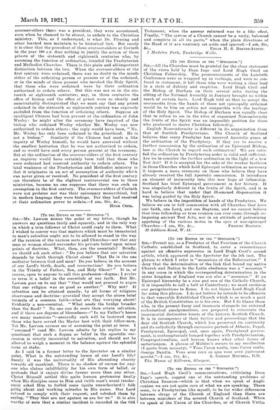(To THE EDITOR or THE " SPECTATOR."1 SIR,—Mr. Lawson misses
the point of my letter, though he answers my questions fairly and squarely, and in the only way in which a true follower of Christ could reply to them. What I wished to convey was that matters which must be immaterial to man's salvation ought not to be allowed to stand in the way of the reunion of the various sects and Churches—not that any man or woman should surrender his private belief upon minor points of doctrine. What, then, are the essentials? Briefly, we should ask each other : "Do you believe that our salvation depends by faith through Christ alone? That He is the one mediator between God and man? Do you believe in the account of our Lord's birth, death, and resurrection? Do you believe in the Trinity of Father, Son, and Holy Ghost?" It is, of course, open to anyone to call this profession—dogma; I prefer to term it a belief in the essentials of our faith. But Mr. Lawson goes on to say that " they would not proceed to argue that our religion was as good as another." Why not? If salvation can be attained equally, by all forms of religious observance and doctiine—provided they accept the above brief formula of a common faith—what are they worrying about? Evidently a non-essential. " What needs the bridge broader than the flood? " No one can do more than attain salvation, and if there are degrees of blessedness—" In my Father's house are many mansions "—assuredly such will be bestowed upon those who have served the Master best with their fellow-men. Yet Mr. Lawson accuses me of assuming the point at issue. I "assumed" (and Mr. Lawson admits by his replies to my questions) that such a dogma as belief in the apostolic suc- cession is utterly inessential to salvation, and should not be allowed to weigh a moment in the balance against the splendid issue at stake.
As I said in a former letter to the Spectator on a similar point, What is the outstanding lesson of our Lord's life? Surely it was the universality of His abounding charity towards all mankind. There is no shadow of excuse for any- one who claims infallibility for his own form of belief. or pretends that it enjoys divine favour more than any other. Christ Himself settled this quite human pretension finally when His disciples came to Him and (with man's usual intoler-
ance) asked Him to forbid some (quite unauthorized]) folk goifig about and working miracles in His name. Our Lord refused to comply with their request, and rebuked them by saying, " They that are not against us are for us." It is also worthy of note that a similar incident is recorded in the Old
Testament, when the answer returned was to a like effect. Finally, " The system of a Church cannot be a unity, balanced and complete in all its parts," when the plain directions of the Head of it are wantonly set aside and ignored.—I are, Sir,
1 Madeira Park, Tunbridge Wells.


































 Previous page
Previous page